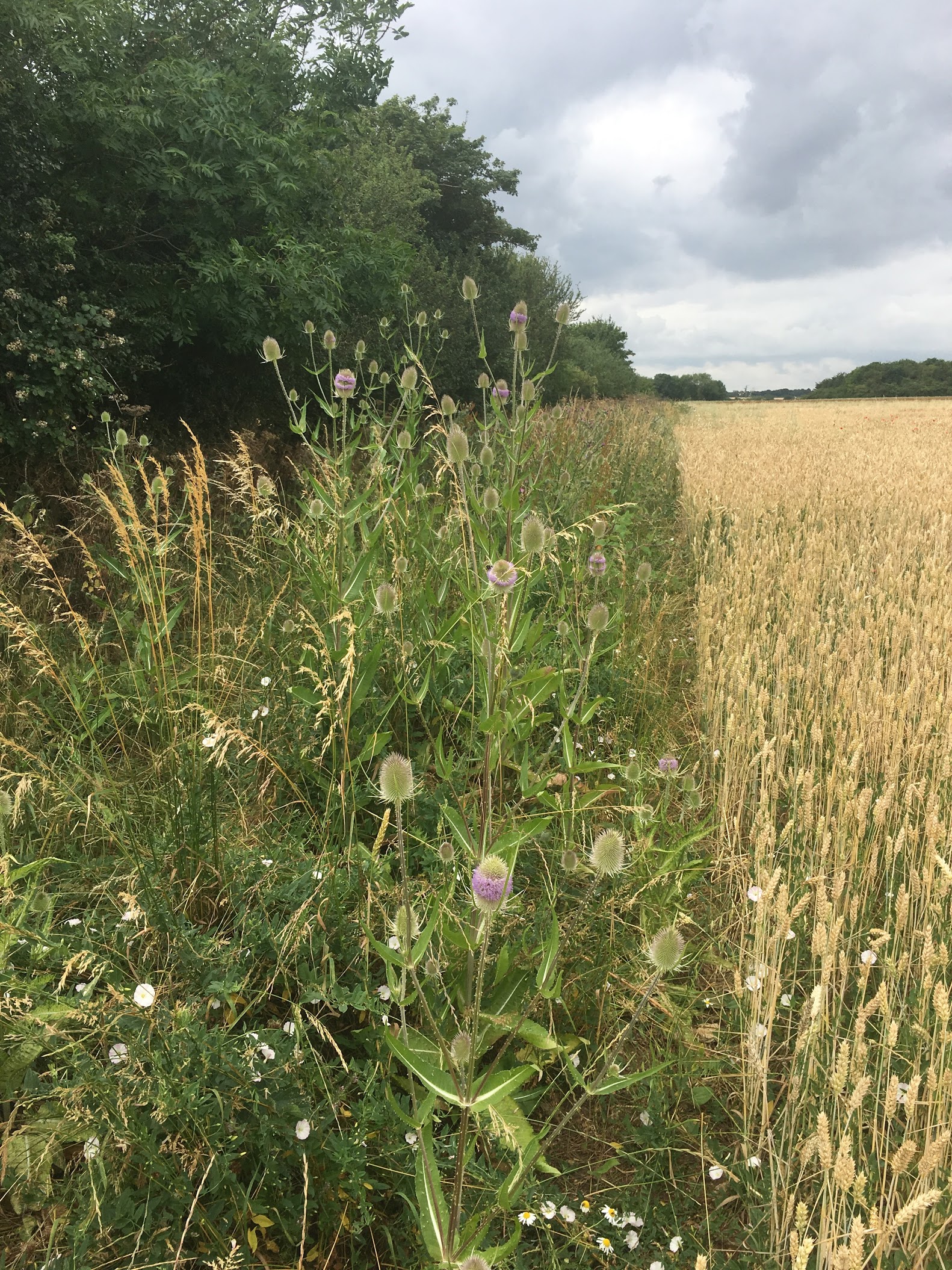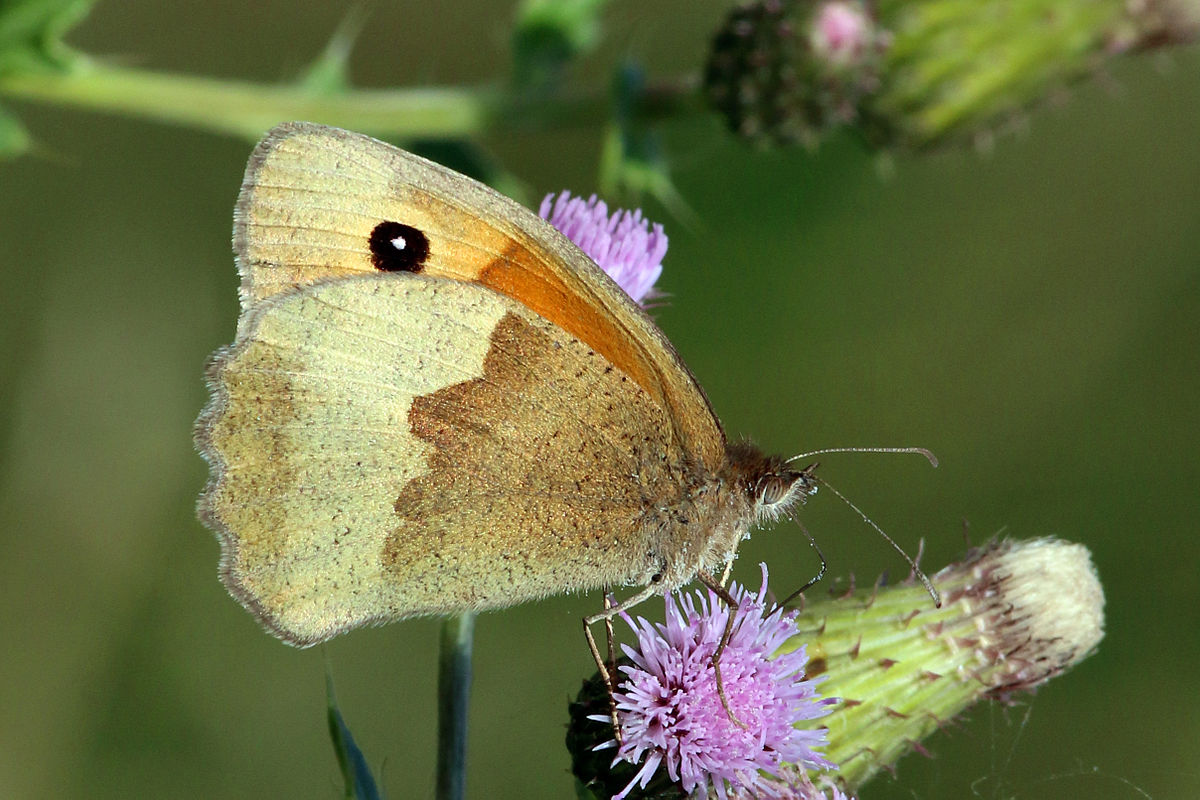Research
Organic farming and biodiversity
Farmland biodiversity in Europe has been declining for some time, particularly steeply in the second half of the twentieth century. The consensus is that agricultural intensification is largely responsible. Organic farming is a low intensity system, offering benefits to biodiversity. Using two paired-farm studies, we explored the responses of different taxonomic groups to organic farming. In the first, smaller-scale, study, positive impacts of organic farming on butterflies and spiders were found. In the second, large-scale, study of eighty-nine farm pairs across England, organic farming was mainly associated with positive effects on biodiversity, although there was substantial variation in the size of effects among taxonomic groups surveyed. The largest and most consistent (positive) effects were for plants and the smallest effects were for carabid beetles. Spiders were influenced by farming system, surrounding landscape, and their dispersal ability. Hunting spiders, which tend to have lower dispersal ability, were more abundant and species-rich on organic compared to conventional farms (this effect was more pronounced in landscapes with less arable). There were no farming system or landscape effects found on web-building spiders, which have generally higher dispersal abilities. There was little evidence that non-cropped habitat effects explained the observed differences for either group. Our research suggests that the farming system differences for spiders in the crop were largely attributable to differences in crop management (such as reduced inputs of pesticides and fertilizers). The results highlight the importance of developing strategies for managing farmland at the landscape scale for most effective conservation of biodiversity.
Ruth E. Feber
Paul J. Johnson
Dan E. Chamberlain
Leslie G. Firbank
Robert J. Fuller
Barbara Hart
Will Manley
Fiona Mathews
Lisa R. Norton
Martin Townsend
David W. Macdonald
References
Feber, R.E., Johnson, P.J., Chamberlain, D., Firbank, L.G., Fuller, R.J., Hart, B., Manley, W., Mathews, F., Norton, L., Townsend, M., Macdonald, D.W. (2015) Does organic farming affect biodiversity? In: Wildlife Conservation on Farmland. Eds: D.W. Macdonald & R.E. Feber. Oxford University Press.
Feber, R.E., Johnson, P.J., Bell, J.R., Chamberlain, D., Firbank, L.G., Fuller, R.J., Manley, W., Mathews, F., Norton, L., Townsend, M., Macdonald, D.W. (2015) Organic farming: Biodiversity impacts can depend on dispersal characteristics and landscape context. PLoS ONE 10(8): e0135921. doi:10.1371/journal.pone.0135921
Chamberlain, D.E., Joys, A., Johnson, P.J., Norton, L., Feber, R.E. & Fuller, R.J. (2010). Does organic farming benefit farmland birds in winter? Biology Letters, 6, 82-84.
Norton, L., Johnson, P.J., Joys, A., Stuart, R., Chamberlain, D., Feber, R.E., Firbank, L., Manley, W., Wolfe, M., Hart, B., Mathews, F., Macdonald, D., Fuller, R.J. (2009) Consequences of organic and non-organic farming practices for field, farm and landscape complexity. Agriculture Ecosystems & Environment, 129, 221-227.
Feber, R.E., Johnson, P.J., Firbank, L.G., Hopkins, A. and Macdonald, D.W. (2007) A comparison of butterfly populations on organically and conventionally managed farmland. Journal of Zoology (London), 273, 30-39.
Macdonald, D.W., Tattersall, F.H., Service, K.M., Firbank, L.G. and Feber, R.E. (2007) Mammals, agri-environment schemes and set-aside – what are the putative benefits? Mammal Review, 37, 259-277.
Fuller R.J., Norton, L.R., Feber, R.E. , Johnson, P.J. , Chamberlain, D.E., Joys, A.C., Mathews, F., Stuart, R.C., Townsend, M.C., Manley, W.J., Wolfe, M.S., Macdonald, D.W., and Firbank, L.G. 2005. The scale of benefits to biodiversity from organic farming. Biology Letters, 1: 431-434.
Cobb, R., Feber, R.E., Hopkins, A. Stockdale, E., O’Riordan, T., Clements, B., Firbank, L., Goulding, K. Jarvis, S. & Macdonald, D.W. (1999) Integrating the environmental and economic consequences of converting to organic agriculture: evidence from a case study. Land Use Policy, 16: 207-221.
Feber, R.E., Bell, J., Johnson, P.J., Firbank, L.G. and Macdonald, D.W. 1998. The effects of organic farming on the surface-active spider (Araneae) assemblages in wheat in southern England, U.K. Journal of Arachnology, 26:190-202.
Feber, R.E., Firbank, L.G., Johnson, P.J. and Macdonald, D.W. 1997. The effects of organic farming on pest and non-pest butterfly abundance. Agriculture, Ecosystems and Environment, 64: 133-139.
Shore, R.F., Feber, R.E., Firbank, L.G., Fishwick, S.K., Macdonald, D.W. and Norum, U. 1997. The impacts of molluscicide pellets on spring and autumn populations of wood mice Apodemus sylvaticus. Agriculture, Ecosystems and Environment, 64: 211-217.
-
 © Ruth Feber
© Ruth Feber -
 © Charles Sharp
© Charles Sharp





